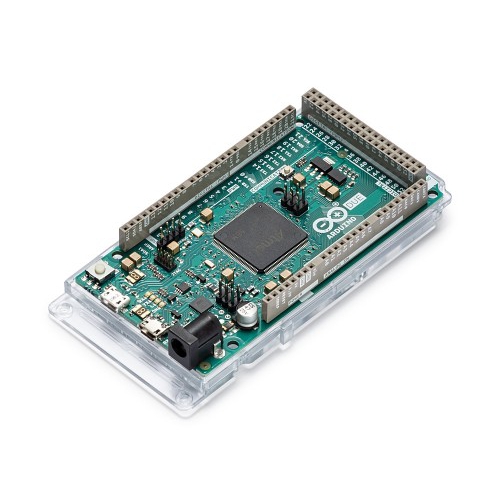The Arduino Due is a microcontroller board based on the Atmel SAM3X8E ARM Cortex-M3 CPU (datasheet). It is the first Arduino board based on a 32-bit ARM core microcontroller. It has 54 digital input/output pins (of which 12 can be used as PWM outputs), 12 analog inputs, 4 UARTs (hardware serial ports), a 84 MHz clock, an USB OTG capable connection, 2 DAC (digital to analog), 2 TWI, a power jack, an SPI header, a JTAG header, a reset button and an erase button.
Warning: Unlike other Arduino boards, the Arduino Due board runs at 3.3V. The maximum voltage that the I/O pins can tolerate is 3.3V. Providing higher voltages, like 5V to an I/O pin could damage the board.
The board contains everything needed to support the microcontroller; simply connect it to a computer with a micro-USB cable or power it with a AC-to-DC adapter or battery to get started. The Due is compatible with all Arduino shields that work at 3.3V and are compliant with the 1.0 Arduino pinout.
The Due follows the 1.0 pinout:
-
TWI: SDA and SCL pins that are near to the AREF pin.
-
The IOREF pin which allows an attached shield with the proper configuration to adapt to the voltage provided by the board. This enables shield compatibility with a 3.3V board like the Due and AVR-based boards which operate at 5V.
-
An unconnected pin, reserved for future use.The Due has a dedicated forum for discussing the board.
-
ARM Core benefits
-
The Due has a 32-bit ARM core that can outperform typical 8-bit microcontroller boards. The most significant differences are:
-
A 32-bit core, that allows operations on 4 bytes wide data within a single CPU clock. (for more information look int type page).
-
CPU Clock at 84Mhz.- 96 KBytes of SRAM.- 512 KBytes of Flash memory for code.
-
a DMA controller, that can relieve the CPU from doing memory intensive tasks.
Documents
- Schematics
- SAM3X-Arduino Pin Alignment
-
Development Environment: Download
-
Arduino's Official Site
Category

|
|
| Name | Arduino Due |
|---|---|
| Code | ARDUINO-A000062 |
| SKU# | 1096 |



